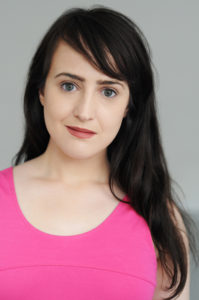Meet the 2019 AHA LGBTQ Humanist Awardee, Mara Wilson
 Mara Wilson (photo by Ari Scott)
Mara Wilson (photo by Ari Scott) The American Humanist Association (AHA) is happy to announce writer and former child actress Mara Wilson as our 2019 LGBTQ Humanist Award recipient!
Mara Wilson first debuted her talent on the big screen when she appeared in the 1993 comedy Mrs. Doubtfire, starring Robin Williams and Sally Field. In 1994 she appeared in the films A Time to Heal and the remake of Miracle on 34th Street as the little girl whose task it is to prove the magic of Santa Claus. (Raised Jewish, Wilson never believed in Santa Claus herself). In 1995 she received the ShoWest Award for “Young Star of the Year,” and in 1996, at the age of nine, was cast as the lead in Matilda. The film is an adaptation of Roald Dahl’s book, which was one of her favorites as a child.
After starring in three other films, Wilson retired from film acting. She graduated from Idyllwild School of Music & Arts in 2005 and went on to attend New York University. Then, in 2015, after a fifteen-year hiatus from acting, Wilson returned in the comedy-drama Billie Bob Joe. The following year she appeared in an episode of the TV show Broad City that paid homage to the Heimlich scene in Mrs. Doubtfire.
Her latest efforts are mostly focused off-screen, with a regular appearance on the podcast Welcome to Night Vale in the role of “The Faceless Old Woman Who Secretly Lives in Your Home.” She’s also done voice work in Season 3 of BoJack Horseman and Big Hero 6.
Wilson has a passion for writing, too. Her written work has appeared on Elle.com, McSweeney’s, the New York Times, Reductress, VanityFair, the Daily Beast, Jezebel, Cracked, Talkhouse Film, and The Toast. Her play Sheeple premiered at the New York International Fringe Festival in 2013, and she is the author of the 2016 autobiography Where Am I Now?: True Stories of Girlhood and Accidental Fame, which was listed in NPR’s “Guide to 2016’s Great Reads.” Wilson also posts regularly on her blog—Shan’t We Tell The Vicar?—where she tells her stories of Hollywood, friendships, parental loss, mental health, and more.
In 2013 Wilson was interviewed at Theater Mania together with Max Reuben, the director of her play Sheeple and a collaborator since college. Asked about characters in the play whose deeply held convictions are broken, Wilson talked about becoming an atheist:
When I was fifteen, I read the His Dark Materials trilogy by Philip Pullman. It’s a retelling of Paradise Lost with the premise that the God that we know is not actually God. I was OCD and I worried a lot about what God thought. These books put forward a pretty good case that maybe there was no God. I remember breaking down and crying when I read it because it altered the way I saw the world. Eventually, I saw Julia Sweeney’s monologue Letting Go of God. That changed everything. I walked out of the theater and said, “You know what, I don’t believe there is a God, and I’m OK with that.” That book shattered me in a way. It opened my mind. That play helped me to heal. That’s a theme in my life.
Diagnosed with obsessive-compulsive disorder at the age of twelve, and having dealt with depression and anxiety as well, in 2015 Wilson partnered with Project UROK—a nonprofit geared towards teens and young adults with the goal of ending the stigma and isolation of mental illness.
“It’s very hard to be a perfectionist growing up in the film world,” she said in a 2014 interview with the website Longreads. “It reinforces all of your worst fears about perfection and doing things right. It got me into what I think is a pretty toxic mental pattern for a kid, and it’s taken me years to break out of that.”
Following the June 12, 2016, mass shooting at a gay nightclub in Orlando, Florida, Wilson came out as bisexual in solidarity with the LGBTQ community.
This year, we are excited to honor Mara Wilson with the 2019 LGBTQ Humanist Award at Pitzer College in Claremont, California, on June 8. To register and see more awardees, visit conference.americanhumanist.org.
